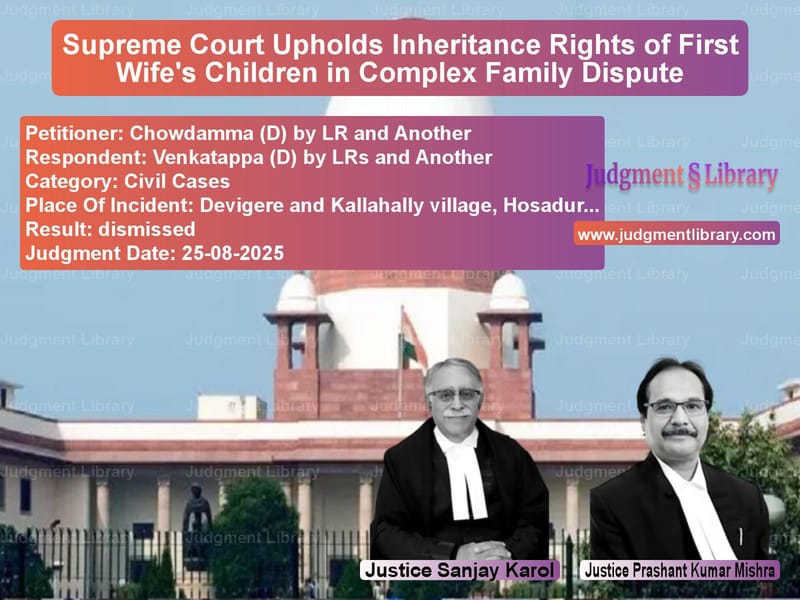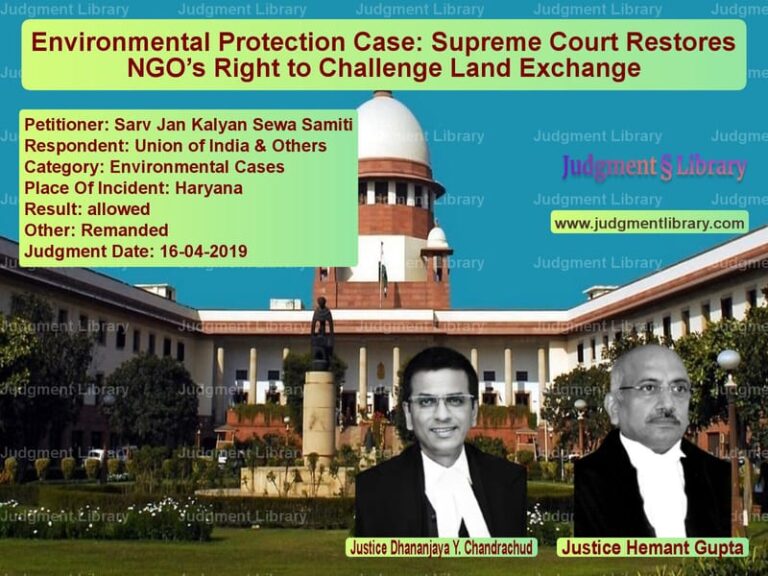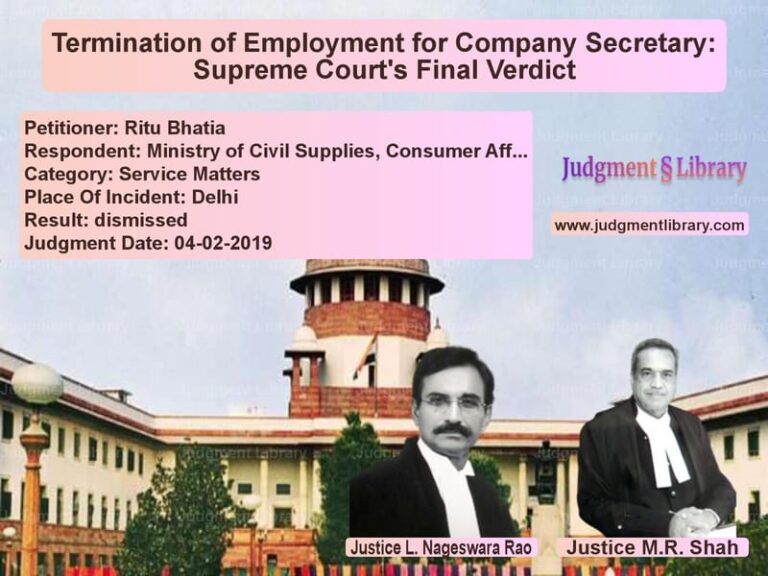Supreme Court Upholds Inheritance Rights of First Wife’s Children in Complex Family Dispute
In a landmark judgment that reinforces the legal rights of children from first marriages in property disputes, the Supreme Court has upheld the inheritance claims of two children whose mother was allegedly driven out of her matrimonial home when their father took a second wife. The case involved a complex family dispute spanning generations and multiple properties in Karnataka, with the Court delivering a comprehensive judgment that clarifies several important legal principles regarding marriage presumption, burden of proof, and inheritance rights.
The dispute centered around the family of Thimmabovi Vellappa, who had two sons – Dasabovi and Venkatappa. Dasabovi, the elder son, was at the heart of the controversy. According to the plaintiffs, Venkatappa and Siddamma, their mother Bheemakka was Dasabovi’s first wife, and they were born from this marriage. However, when Dasabovi later married Chowdamma (the second wife), Bheemakka and her children were allegedly forced to leave the matrimonial home and relocate to her parental village. After Dasabovi’s death, the children from the first marriage claimed their rightful share in the ancestral properties, leading to a legal battle that traveled through multiple courts over many years.
The suit properties included agricultural lands bearing Survey Nos. 39/1B, 149, 41/1P, 37/1, 37/1A, and 29/9, along with a house property in Devigere and Kallahally villages of Hosadurga Taluk. The plaintiffs claimed that these properties were part of the ancestral estate and that they were entitled to a share as legitimate heirs of Dasabovi.
The defendants, Chowdamma (the second wife) and her son Balachandrappa, vehemently denied that Dasabovi had ever married Bheemakka. They contended that Chowdamma was Dasabovi’s only wife and that the plaintiffs had no legal right to claim any share in the properties. The trial court initially dismissed the plaintiffs’ suit, accepting the defendants’ version of events. However, the Karnataka High Court reversed this decision and decreed the suit in favor of the plaintiffs, leading to the current appeal before the Supreme Court.
The Crucial Legal Battle Over Marriage Validation
The central issue before the Supreme Court was whether the plaintiffs had successfully proved that their mother Bheemakka was legally married to Dasabovi. This was crucial because without establishing this relationship, the plaintiffs would have no claim to the ancestral properties.
The appellants (defendants) argued vigorously that “the plaintiffs/respondents have miserably failed to adduce cogent and reliable evidence to prove that the plaintiffs’ mother was married to Dasabovi. Mere submission of genealogical tree is not a proof of factum of marriage.” They also challenged the High Court’s approach, contending that “the High Court was wholly unjustified in drawing adverse inference for defendant no.1’s failure to depose as she was medically unfit due to arthritis.”
On the other side, the respondents (plaintiffs) maintained that “the Trial Court recorded a perverse finding in respect of the marriage of plaintiffs’ mother with Dasabovi despite there being sufficient evidence on record.” They relied heavily on the testimony of P.W.2 Hanumanthappa, arguing that “a reading of plaintiffs’ evidence, particularly the evidence of P.W.2 (Hanumanthappa), would clearly prove that the plaintiffs’ mother was married to Dasabovi.”
The Supreme Court’s Detailed Analysis of Evidence
The Supreme Court conducted a meticulous examination of the evidence, particularly focusing on the testimony of P.W.2 Hanumanthappa, a 75-year-old resident of Antharagange village. The Court noted that he had provided detailed evidence about the relationship between Dasabovi and Bheemakka, stating that “the deceased Dasabovi married the plaintiffs’ mother, Bheemakka, 57 years ago at Antharagange village, in accordance with the prevailing customs of their community.”
The Court emphasized the importance of Section 50 of the Indian Evidence Act, which deals with opinion on relationship. Quoting from its earlier decision in Dolgobinda Paricha v. Nimai Charan Misra, the Court explained that “when the court has to form an opinion as to the relationship of one person to another the opinion expressed by conduct as to the existence of such relationship of any person who has special means of knowledge on the subject of that relationship is a relevant fact.”
The Court found that P.W.2 Hanumanthappa satisfied the requirements of Section 50, noting that “his belonging to the same village as the plaintiffs reflects community-level proximity and sustained acquaintance with the familial relations in issue. This satisfies the statutory requirement of ‘special means of knowledge’ under Section 50 of the Evidence Act.”
The Presumption of Marriage Principle
One of the most significant aspects of the judgment was the Court’s application of the presumption of marriage in cases of long-term cohabitation. The Court referred to several landmark decisions, including Badri Prasad v. Dy. Director of Consolidation, where it was held that “A strong presumption arises in favour of wedlock where the partners have lived together for a long spell as husband and wife. Although the presumption is rebuttable, a heavy burden lies on him who seeks to deprive the relationship of legal origin. Law leans in favour of legitimacy and frowns upon bastardy.”
Similarly, the Court cited the Privy Council’s observation in Andrahennedige Dinohamy that “where a man and woman are proved to have lived together as man and wife, the law will presume, unless the contrary be clearly proved, that they were living together in consequence of a valid marriage and not in a state of concubinage.”
Applying these principles to the present case, the Court found that “a reasonable presumption can, therefore, be drawn that the deceased Dasabovi maintained the relationship with the plaintiffs’ mother even after marrying defendant No.1. This, in turn, gives rise to a presumption that the deceased Dasabovi and the plaintiffs’ mother have lived as husband and wife.”
The Critical Failure of Defendant No.1 to Testify
Perhaps the most damning aspect for the appellants was the Supreme Court’s strong criticism of defendant No.1 Chowdamma’s failure to testify. The defendants had claimed she was unable to appear due to arthritis, but the Court found this explanation unconvincing.
The Court noted that “the deposition of D.W.1 (Balachandrappa) clearly indicates that defendant No. 1 was physically present in the Court during the examination of D.W.2 (G.V. Venkatappa), D.W.3 (Thimmappa) and D.W.4 (V. Thimmappa). It further emerges that defendant No.1 was also present in the Court when the evidence of P.W.1 (Venkatappa) was being recorded.”
This led the Court to conclude that “If defendant No.1 was capable of attending the Court on multiple occasions, no explanation remains for her failure to offer her own testimony, except for calculated restraint.” The Court described this as “not a case of medical inability but of deliberate silence.”
The Court invoked the principle established in Vidhyadhar v. Manikrao, where it was held that “Where a party to the suit does not appear in the witness box and states his own case on oath and does not offer himself to be cross-examined by the other side, a presumption would arise that the case set up by him is not correct.”
The Court also pointed out that defendant No.1 could have availed of the remedy under Order XXVI, Rule 1 of the Code of Civil Procedure, which permits recording evidence through a commission in cases of age or infirmity. Her failure to do so further strengthened the adverse inference against her.
Revenue Records Cannot Determine Title
The defendants had relied heavily on revenue records showing their names to support their claim of exclusive ownership. However, the Supreme Court firmly rejected this argument, citing its earlier decision in Suraj Bhan v. Financial Commissioner, where it was held that “It is well settled that an entry in revenue records does not confer title on a person whose name appears in record-of-rights. It is settled law that entries in the revenue records or jamabandi have only ‘fiscal purpose’ i.e. payment of land revenue, and no ownership is conferred on the basis of such entries.”
This clarification is significant as it prevents revenue records from being misused to defeat legitimate inheritance claims.
Burden of Proof and Shifting Onus
The Court also elaborated on the distinction between burden of proof and onus of proof, referring to Anil Rishi v. Gurbaksh Singh, where it was explained that “There is another aspect of the matter which should be borne in mind. A distinction exists between burden of proof and onus of proof. The right to begin follows onus probandi… Burden of proof is used in three ways: (i) to indicate the duty of bringing forward evidence in support of a proposition at the beginning or later; (ii) to make that of establishing a proposition as against all counter-evidence; and (iii) an indiscriminate use in which it may mean either or both of the others.”
The Court found that the plaintiffs had successfully discharged their initial burden through the testimony of P.W.2 and the genealogical chart, thereby shifting the onus to the defendants to rebut this evidence. Since the defendants failed to provide any substantive evidence to counter the plaintiffs’ claims, the Court ruled in favor of the plaintiffs.
Broader Implications of the Judgment
This judgment has far-reaching implications for property disputes involving multiple marriages and inheritance claims. It reinforces the legal protection available to children from earlier marriages who might otherwise be disinherited through manipulation of records or exclusion from family properties.
The Court’s strong stance on the presumption of marriage provides crucial protection to women in informal or customary marriages, ensuring that their children’s inheritance rights are not easily defeated by technical arguments about formal proof of marriage.
The judgment also serves as a warning to litigants who attempt to avoid testifying in cases where they possess crucial information. The Court’s willingness to draw adverse inferences in such situations strengthens the truth-seeking function of the judicial process.
Furthermore, the clarification about revenue records prevents the misuse of administrative documents to override substantive inheritance rights, ensuring that property disputes are decided based on legal entitlements rather than mere entries in government records.
In conclusion, the Supreme Court’s judgment represents a significant victory for the protection of inheritance rights, particularly in complex family situations involving multiple marriages. By upholding the claims of the children from the first marriage and providing clear guidelines on evidence evaluation in relationship disputes, the Court has strengthened the legal framework for resolving such emotionally charged and factually complex cases.
Petitioner Name: Chowdamma (D) by LR and Another.Respondent Name: Venkatappa (D) by LRs and Another.Judgment By: Justice Sanjay Karol, Justice Prashant Kumar Mishra.Place Of Incident: Devigere and Kallahally village, Hosadurga Taluk, Karnataka.Judgment Date: 25-08-2025.Result: dismissed.
Don’t miss out on the full details! Download the complete judgment in PDF format below and gain valuable insights instantly!
Download Judgment: chowdamma-(d)-by-lr-vs-venkatappa-(d)-by-lr-supreme-court-of-india-judgment-dated-25-08-2025.pdf
Directly Download Judgment: Directly download this Judgment
See all petitions in Property Disputes
See all petitions in Succession and Wills
See all petitions in Judgment by Sanjay Karol
See all petitions in Judgment by Prashant Kumar Mishra
See all petitions in dismissed
See all petitions in supreme court of India judgments August 2025
See all petitions in 2025 judgments
See all posts in Civil Cases Category
See all allowed petitions in Civil Cases Category
See all Dismissed petitions in Civil Cases Category
See all partially allowed petitions in Civil Cases Category







